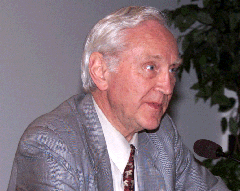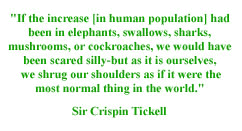Risk and Conflict: Resource and Population Pressures
Overview
Sir Crispin Tickell, Chancellor of the University of Kent at Canterbury, Chairman of the Climate Institute of Washington D.C., and President of the Earth Centre in South Yorkshire
 April 10, 2001 - There are few greater challenges to human society than the risks of conflict arising from human population growth and resource depletion. Sir Crispin Tickell, a longtime British diplomat and former British Permanent Representative to the United Nations whohas also headed a variety of scientific, environmental, and sustainability initiatives, detailed these challenges and the world's difficulty in addressing them in a bracing talk.
April 10, 2001 - There are few greater challenges to human society than the risks of conflict arising from human population growth and resource depletion. Sir Crispin Tickell, a longtime British diplomat and former British Permanent Representative to the United Nations whohas also headed a variety of scientific, environmental, and sustainability initiatives, detailed these challenges and the world's difficulty in addressing them in a bracing talk.
"A Malignant Maladaptation"
Sir Crispin began by stating that the "world looks a messier place than I have known it during my 36 years as a diplomat." He noted, for example, that violence within societies has increased: of the 27 armed conflicts in 1999, all but two were within national boundaries. Power is also devolving—from nation-states to international institutions, to regional and local communities, and to citizens through old and new technologies of communication.
 And the enormous growth in human population and its ever-increasing demands on global resources, said Sir Crispin, are compromising the health of the planet as well as local conditions. In the last century, human population has quadrupled, while air pollution has increased by a factor of five, water use by nine, sulphur emissions by 13, energy use by 16, carbon dioxide emissions by 17, marine fish catches by 35, and industrial output by 40. Sir Crispin maintained that there are few precedents for the current impact on the earth by the human species, whose dominance he called a "malignant maladaptation."
And the enormous growth in human population and its ever-increasing demands on global resources, said Sir Crispin, are compromising the health of the planet as well as local conditions. In the last century, human population has quadrupled, while air pollution has increased by a factor of five, water use by nine, sulphur emissions by 13, energy use by 16, carbon dioxide emissions by 17, marine fish catches by 35, and industrial output by 40. Sir Crispin maintained that there are few precedents for the current impact on the earth by the human species, whose dominance he called a "malignant maladaptation."
The Five Drivers for Global Change
Sir Crispin went on to argue that most of the implications of these trends remain unrecognized, although they are straining human communities everywhere and increasing the potential for violence. He identified five main drivers for global change–each associated with the others, and all pointing towards risks of social breakdown and conflict.
The first driver is the rate of human population increase, with attendant hyperurbanization and increased absolute poverty. Sir Crispin noted that, between 1992 and 2000, some 450 million new people came to inhabit the earth. "If the increase had been in elephants, swallows, sharks, mushrooms, or cockroaches, we would have been scared silly," he said, "but as it is ourselves, we shrug our shoulders as if it were the most normal thing in the world."
The second driver is the condition of the land. Increasing populations are claiming more and more space and resources, resulting in widespread soil degradation and advancing deserts. Soil depletion, said Sir Crispin, affects some 10% of current world agricultural areas. Meanwhile, increases in food supplies have not kept pace with population growth, and almost a billion people are today undernourished. Similarly, while demand for water (the third driver) doubles every 21 years, water supplies have remained at the same level they were thousands of years ago. The United Nations Environmental Programme has already referred to the existence of "a global water crisis," as major rivers become toxic streams and ocean fish stocks decline past recoverability.
Damage to ecosystems is an additional factor. Sir Crispin said that humans are causing extinction at 1000 times the normal rate, altering the course of evolution itself. The consequences are reduced food supplies and medicine as well as severe damage to forests, wetlands, soil fertility, and the natural cycles of waste reclamation. The final driver, atmospheric chemistry changes, includes acidification from industry, depletion of the atmospheric ozone layer, and the degree of global warming that greenhouse gases will spur. Sir Crispin stated that the combination of these five drivers is most worrying. Impelled by continued human population growth and economic expansion, these factors will eventually result in a creeping contagion of economic breakdown and state failure.
The Conflict-Resource Connection
Sir Crispin said that, while triggers for individual conflicts over resources are most difficult to predict, resource depletion in poor countries has led to a myriad of conflict precursors: poverty, inequity, community tension, and weakened institutions. He also argued  that, while industrial countries' vulnerability to these problems is masked by their overconsumption and dependence on fossil fuels, they are generally more vulnerable than supposed. Modern conflicts between nation-states over resources have so far been rare (with the exception of oil); but this may change. Disputes over water could be a casus belli, as could transboundary export of pollution. "What states do to the environment within their boundaries is no longer for them alone," he said.
that, while industrial countries' vulnerability to these problems is masked by their overconsumption and dependence on fossil fuels, they are generally more vulnerable than supposed. Modern conflicts between nation-states over resources have so far been rare (with the exception of oil); but this may change. Disputes over water could be a casus belli, as could transboundary export of pollution. "What states do to the environment within their boundaries is no longer for them alone," he said.
Refugees are an additional consequence as well as a cause of environmental and state destabilization. Although cases overlap, Sir Crispin noted that there are more environmental refugees (25 million) then there are political refugees, with particularly large numbers in sub-Saharan Africa. And since one-third of humanity lives within 60 kilometers of a coastline, predicted sea-level increases caused by climate change could cause additional massive migrations and tremendous stress on both developed and developing nations.
Sir Crispin concluded on a note of some pessimism. He noted that, while there are prominent cases of transboundary cooperation in the management of environmental flashpoints, catastrophe may be needed to shock people into thinking of the environment, population, and conflict as globally interrelated dynamics.
Bush, Kyoto, and The Future
In response to audience questions, Sir Crispin called the current vogue for market forces as a final arbiter of value a "fashionable delusion," and said that in the last resort the public interest must prevail. He said that the next 50 years will be an extremely difficult period and will see much more disorder and painful adjustment to the limits of environmental resources and population growth.
A regular adviser to British Prime Minister Tony Blair on environmental issues, Sir Crispin said that most governments and institutions are not at the moment well-geared to these problems, and that authoritarian governments often set such big concerns aside altogether because of their ineffective chains of command. He castigated the Bush administration for its recent disavowal of the Kyoto Protocols, saying that the move "shocked and dismayed" Europeans and was an abdication of responsibility "truly out of step with the rest of the world." He raised the possibility that European governments might impose import taxes on U.S. imports to redress the competitive balance, and noted that German consumers are organizing boycotts of U.S. products as a result of the Kyoto announcement.
Sir Crispin ended the discussion period by stressing the importance to population growth reduction of global female empowerment, education, availability of contraceptive devices, and better pensions and state institutions of elderly care.
Hosted By

Environmental Change and Security Program
The Environmental Change and Security Program (ECSP) explores the connections between environmental change, health, and population dynamics and their links to conflict, human insecurity, and foreign policy. Read more
Thank you for your interest in this event. Please send any feedback or questions to our Events staff.








